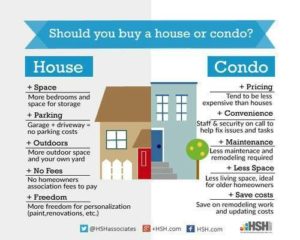
If you’re in the market for a new residence, you may be comparing the idea of a house to a condo. Which one is better for you? In many cases, they can be very comparable in price depending on the neighborhood and the square footage, so what’s the right call?
There are a number of factors that go into this decision and many things you need to consider when making the choice.
First of all, what is a condo (a.k.a. condominium)? Simply put, it’ a private residential unit in a multiunit building. Some condos are laid out like an apartment, with your unit all on one floor and an elevator or staircase for the building. Others may be laid out more like a townhouse, with each unit having multi-levels.
And still others may be more similar to a home with 2-3 bedrooms, bathrooms, and even a porch and a garage, but they’re connected to another home. In this case, builders usually put front doors and garages on opposite sides of the building to give each owner more privacy.
Some condos are apartment buildings or row houses that are converted to condos, and others are built as brand new condominiums. The biggest factor in a condominium structure is the HOA fee or the condo fee. This is a monthly fee that is paid to the association overseeing the upkeep of the property.
This condo fee can be a big deciding factor in determining if a condo purchase or a home purchase is right for you. Even if the condo is less expensive and your mortgage is less than that of a home, the monthly condo fee can increase your monthly expenses and you may end up paying the same or even more each month.
The Pros and Cons
There can be reasons other than cost that may have you considering a condo over a home.
Upkeep – Your condo fee almost always takes care of the upkeep of the property. This includes cutting grass, raking leaves, shoveling snow, planting flowers, painting parking lot lines and numbers, etc. If you’re older and don’t want to deal with these tasks, or you’re too busy, condo living may be a great option for you.
Utilities – In some cases, your condo fee includes basic utilities like water, electric, gas, and trash service. Having this rolled into your fee means there are no surprises on your monthly bills, you don’t have to set up and maintain these accounts, and you only have to pay one bill every month.
Security – Not only is there comfort in knowing your neighbors are very close by, condo communities are often gated or the buildings are secured which keeps you better protected from potential crime.
Community Amenities – Many condominium complexes offer additional amenities that are included in your condo fee. Amenities such as pool, fitness center, BBQ area, tennis courts, walking trails, and more.
There can be some cons too that may make you consider home ownership over a condo.
Close Proximity – Your neighbors are just on the other side of your wall which means you might be able to hear their TV or smell their dinner cooking.
Condo Fees Aren’t Guaranteed – As the building gets older and is in need of more repair, your monthly condo fees can increase to cover the upkeep. And if there’s a one-time major expense, like a new roof, you may receive a bill for a special assessment to help cover this cost.
Less Privacy – Your neighbors are always very close by. And condos usually have rules that you’ll need to conform to in order to reside there like the number and type of pets you can have. They can even tell you that your condo is non-smoking and that you have to go to a designated smoking area. They also have to approve any improvements you make to your condo.
A Condo is More Compact – A two-bedroom condo will almost always be smaller than a two-bedroom house with less square footage. This reduces the amount of space you have to spread out and feel like you have enough space.
Only you can decide if a house or condo is right for you. There are many differences in the way you live and how your residence is maintained. Consider all the factors before deciding which is the best fit for you.